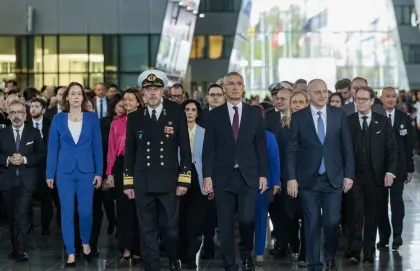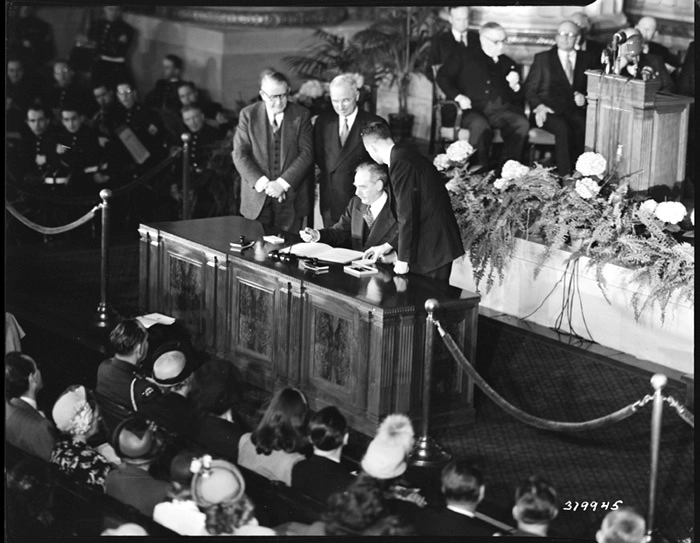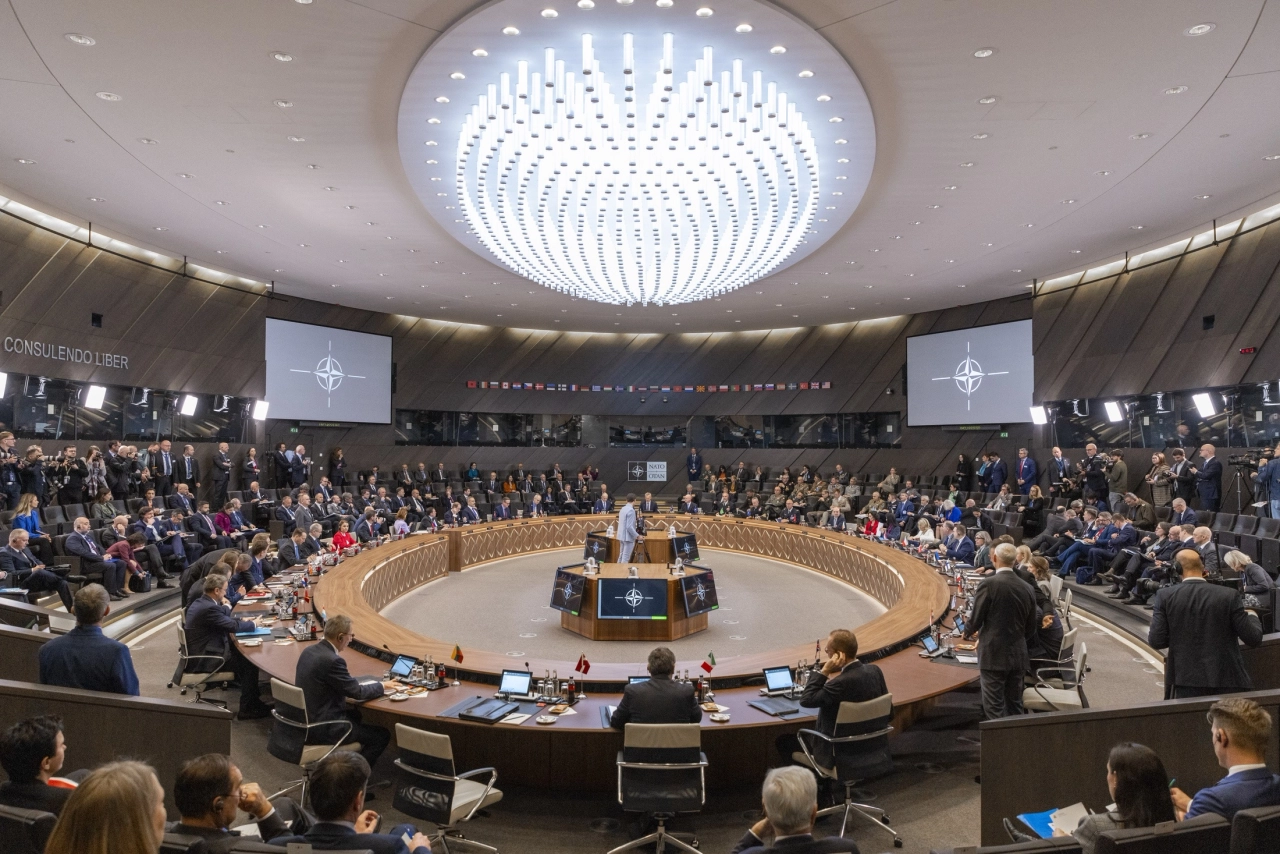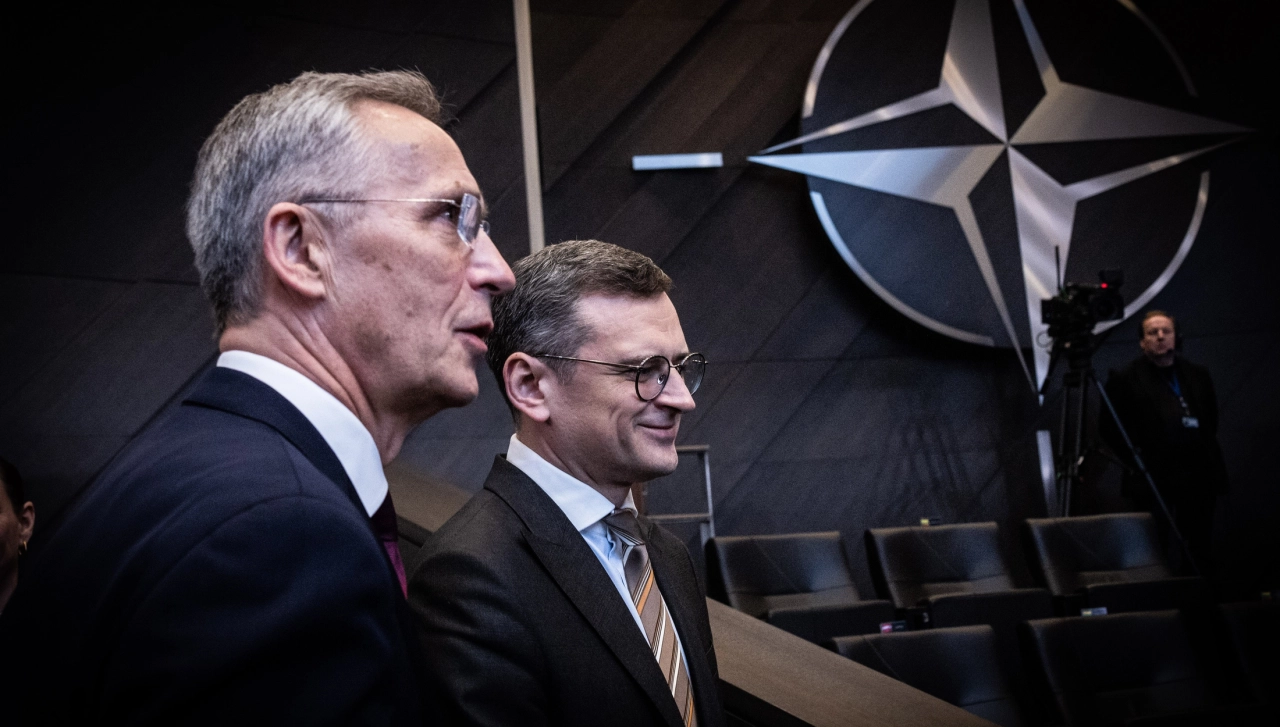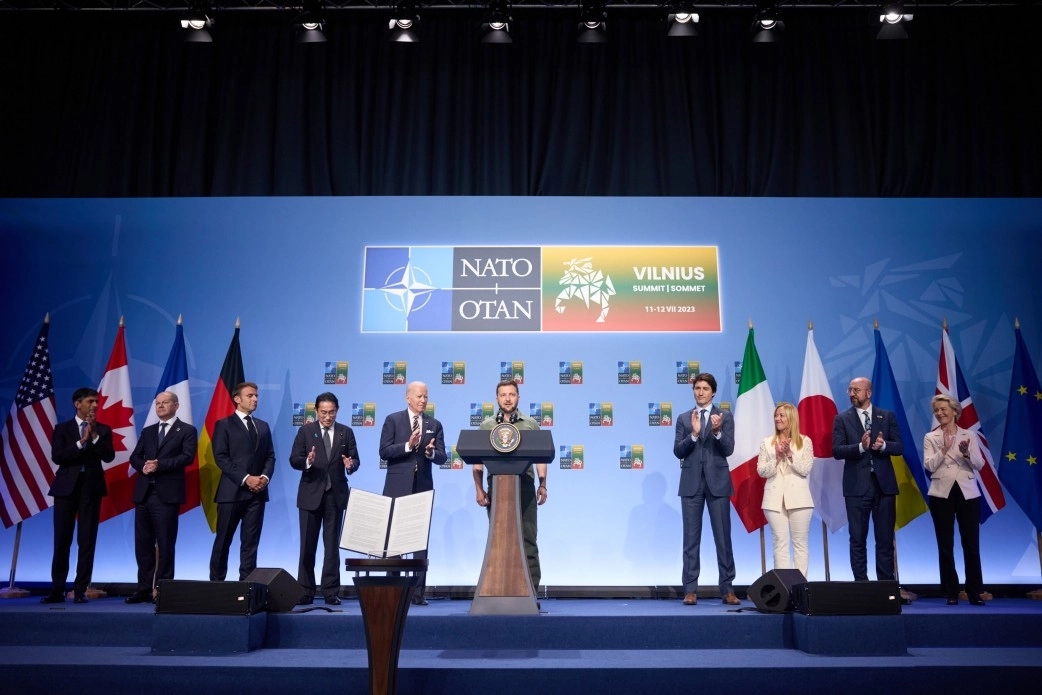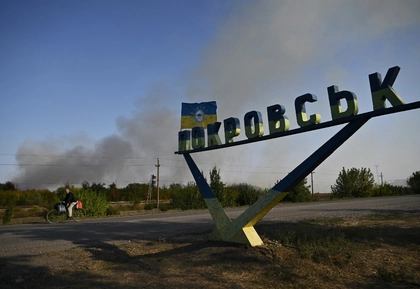April 4 marks the founding day of NATO. On this day in 1949, representatives of 12 countries, including the United States, Great Britain, France, Canada, Italy, and Norway, signed the North Atlantic Treaty in Washington, which was ratified later the same year.
US President Harry Truman declared at the signing ceremony: “Men with courage and vision can still determine their own destiny. They can choose slavery or freedom – war or peace…”.
JOIN US ON TELEGRAM
Follow our coverage of the war on the @Kyivpost_official.
During the post-war years, the 33rd President of the United States, who had an in-depth understanding of USSR politics during Stalin’s era, proposed and implemented the Truman Doctrine. This program aimed to stop the spread of communism worldwide, especially the creeping Stalinist aggression.
His efforts helped prevent the Third World War, which was looming during the 1948 blockade of West Berlin by a 300,000-strong Soviet military group. As a result, the Cold War began and continued until the collapse of the Soviet Union in 1991.
NATO realized the threat from Russia
In an exclusive comment to Kyiv Post, Ukrainian lawmaker Yehor Cherniev, who leads the Ukrainian delegation to the NATO Parliamentary Assembly (PA), said:
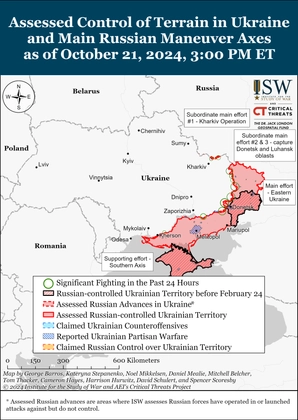
ISW Russian Offensive Campaign Assessment, October, 22, 2024
“NATO was initially formed as a military-political alliance, and until the end of the Cold War, it was more focused on military issues than politics. For the past 30 years, until 2022, its focus has been more on politics than military activities. However, with the full-scale invasion of Russia into Ukraine, members of NATO finally realized the threat that their states face in Europe.”
NATO, which is celebrating its 75th year of existence, currently has 32 member states, including Finland and Sweden, who joined NATO amid the full-scale war of Russia against Ukraine.
Meanwhile, some leaders of NATO member states are reconsidering the concept of collective security and acknowledging the end of the era of peace in the world.
“Yet paying tribute to NATO’s past is not enough,” British Defence Minister Grant Shapps said in his column for The Telegraph. “Today we must give urgent thought once again to the Alliance’s future. We have moved from a post-war to a pre-war world. Russia is menacing our neighbors. China is increasingly belligerent. Iran is using its proxies to cause regional havoc... And North Korea is perpetually rattling its nuclear sabre.”
The first thing Shapps called on the Alliance allies to do was to redouble their efforts to support Ukraine, and the second one was to increase their defense budgets. According to him, Britain itself, with a defense budget at 2.28 percent of GDP and a commitment to increase it to 2.5 percent, will continue to be a leader in the Alliance.
Shapps recalled that, “It’s 10 years since NATO allies agreed to meet 2 per cent.” While in 2023 there were only 11 such member countries, NATO Secretary General Jens Stoltenberg expects that this year at least 18 allies will spend 2 percent of their GDP on defense.
Continuing his exclusive commentary to Kyiv Post, Cherniev said:
“Yes, they are changing their doctrines and approaches, they are rearming and increasing their defense spending... But I think this is not enough. When I talk to colleagues from different countries, particularly from Germany, I tell them that they don’t have much time. They must be prepared not only in terms of weapons, but also in their military personnel, for a potential confrontation with Russia, and perhaps with other nations as well.”
The MP has observed that a year ago, his Western colleagues regarded the threat from Russia as a mere formality, but now their attitude has shifted towards a more realistic perception.
“More and more officials in different countries at various levels are saying that a conflict with Russia is becoming more likely. Some predict it could happen in a few years, while others believe it could take place in just a few months. For now, they are gradually increasing their defense budgets [in preparation for potential threat]. However, firstly, it is crucial to inform their people. I also tell them about it, and they ask me what is the best way to do it. Basic medical training, drone exercises, etc. are the minimum,” Cherniev added.
In comments to the Kyiv Post, Oleksandr Merezhko, Chair of the Verkhovna Rada Committee on Foreign Policy and Interparliamentary Relations, said: “Firstly, 75 years of NATO is a success story. Thanks to the Alliance, it was possible to maintain peace in Europe and the world, preventing the outbreak of the Third World War. This indicates that NATO has created the most effective defense and security system in history.”
Merezhenko recalled that back in 2019, Macron claimed that NATO was experiencing “brain death.”
“It turned out that during times of crisis, such as when Russia is trying to destroy the security architecture in Europe and the order based on international law, NATO is the only force that can prevent this... The member countries once again realized how much this organization is important for their survival, so it has become very active. NATO is currently in a challenging phase, and it is succeeding in its efforts,” he said.
Merezhko believes that the aggressive war of Russia against Ukraine is only one element of the Third World War, which is currently raging.
“There is a theory that we are at the epicenter of historical events, and the future of the world, Europe, NATO, the UN, and international law depends on the situation in Ukraine,” he summarized.
€100 billion for weapons for Ukraine over five years
Among the most positive signals of last week’s ministerial meetings and bilateral talks in Brussels was Stoltenberg's proposal to establish a NATO fund worth €100 billion ($108 billion), which would provide Ukraine with "reliable and predictable" military aid financing for the next five years.
However, Ukraine’s Foreign Minister, Dmytro Kuleba, claimed that “in the current funding model, this initiative has zero chances.”
“They cannot collect 500 million, and here they would have to collect 20 billion [per year]... But if it is possible to calculate the formula for the participation of each [NATO member's] mandatory financing contribution, then this idea could exist and has a chance of being implemented,” Kuleba said.
“These meetings in Brussels were important,” said Merezhko, “because I see the efforts of NATO member countries to institutionalize military aid to Ukraine, so that it does not depend on internal political processes in some countries…”
According to Cherniev, if adopted, the new NATO program would make military aid to Ukraine obligatory, unlike the assistance that has been provided by its members on a voluntary basis within the Rammstein format.
“We will understand that we can count on a specific amount in a specific year from all members of the Alliance… But won't these 100 billion include the aid that is already provided to Ukraine under bilateral agreements with individual NATO members? That is, will it not repeat the same story, but in a different form? And whether these 100 billion will be directed specifically to weapons for Ukraine is also in question. Hungary itself can block it…” Cherniev said.
Stoltenberg has assured that an agreement to provide €100 billion for weapons to Ukraine can be reached before the July NATO summit in Washington.
However, Cherniev believes that it is too early to discuss ways to fill this fund, citing the bureaucratic processes within the Alliance and national governments.
Meanwhile, Merezhko is more optimistic and believes that Ukraine will receive the first aid packages within the new NATO program already this year.
"Our partners and allies are well informed about the situation and the danger of leaving Ukraine without military assistance. They see that Russia is using it," Merezhko said.
Ukraine should not expect an invitation to join NATO this year
During the ceremonial events held for NATO’s 75th anniversary in Brussels, Ukraine was hoping to receive clearer messages about its future membership in the Alliance.
“The fact that Ukraine’s Minister Kuleba was invited to the event was a good signal,” Cherniev said. “Sure, we would like more concrete steps from NATO. But we understand that decisions are made by consensus, which unfortunately does not currently exist within NATO.”
According to The New York Times, Kyiv should not expect a formal invitation to join NATO at the Washington summit in July.
“... Alliance officials agree that is not going to happen at the festivities planned for Washington in July. NATO has no appetite for taking on a new member that, because of the alliance’s covenant of collective security, would draw it into the biggest land war in Europe since 1945,” the newspaper reports.
The NYT especially notes that “the United States and Germany remain opposed to offering Ukraine a start to membership negotiations in Washington as they did at last year’s summit in Vilnius.”
“... and they want that issue off the table in July, despite a similar process at the European Union that was approved last winter,” the publication added.
Cherniev said, “We are working at all levels to achieve this result [invitation from NATO]. The president is working at the highest level, the government and the parliament are also involved. We still have time to prove to our partners the need for our membership in NATO for both sides and to speed up the process.”
According to him, Kyiv currently is not expecting the formal invitation yet, but a political decision regarding its membership.
“Why political? Because such the decision will not start the process of ratification in the national parliaments of the member countries, but it will reserve the 33rd place for Ukraine at the general table,” Cherniev said.
The MP confirmed that the Ukrainian side will use every opportunity to achieve a result in Washington, following the events in Brussels last week. “We have upcoming bilateral meetings with various countries, including the USA,” he said.
However, Cherniev also acknowledged that the situation is constantly changing, making it difficult to predict anything.
“Honestly, over the past six months, I have heard different approaches from ‘don’t count on it’ to ‘let’s look for some formula’ on the sidelines. Like last year, this will likely be a discussion until the end. But it is important to us, and we are stressing this in talks with our partners, that it should be the next step, rather than repeat the messages from Vilnius about ‘open doors.’ As I know, our partners are working on it,” the lawmaker said.
According to Merezhko, it would be extremely difficult for Kyiv to receive an invitation at the upcoming NATO summit.
“But the NATO countries realize that if they are not willing to invite Ukraine now, they should at least provide some tangible things to ensure our security until we become a full-fledged member of NATO,” Merezhko said, referring to Stoltenberg’s proposal to allocate €100 billion for weaponry to Ukraine over the next five years.
Security agreements – temporary support or an alternative to NATO?
Cherniev recalled that when Finland and Sweden were invited to join the Alliance, they were given security guarantees until they became members to prevent Russia’s potential attack against them.
“Our partners among NATO’s member states provide us with the same but more expanded agreements that include more specifics. I believe that the number of countries [who sign such deals] could be increased, even beyond NATO,” Cherniev suggested.
The parliamentarian mentioned that such security agreements have two main components.
“Firstly, the aid to Ukraine in various spheres, including military, direct financial, and technological, will be set as an obligation. It is also some replacement for ‘Ramstein’ where countries voluntarily help as much as they can. And here [within the agreements] we are talking about specific numbers,” Cherniev said.
The second component of these agreements, according to him, is actual support for Ukraine on its path to NATO.
"We also have bilateral memorandums with about 30 countries for their support of Ukraine's membership in NATO. The signing of such a memorandum means that Ukraine will have the support of that country when making a decision about its membership,” the MP said.
He also claimed that, “Such agreements are definitely not a replacement for NATO membership. They are meant to support Ukraine’s path to NATO while we have the war on our territory.”
A step towards NATO at the level of the parliament
On March 25, one of the NATO PA events took place in Tallinn. During the meeting of the standing committee, Ukraine, Georgia, and Bosnia and Herzegovina were granted the status of candidates for NATO membership.
“Only the heads and deputy heads of delegations from NATO countries were present there, but as an exception, I was also invited… Ukraine was granted the status of a candidate for NATO membership upon our request as in Vilnius we were upgraded from NATO-Ukraine Commission to the NATO-Ukraine Council that follows the principle of "equal among equals.” Cherniev said.
The People’s Deputy reported that the Ukrainian delegation in the NATO PA had suggested a particular solution that would grant it more rights. As a result, a new formula was created for the NATO PA – the status of a candidate country, as opposed to its previous status as a partner country.
“This means that we will have more representation with 12 members participating at the same level as other delegations (as opposed to the previous 8). We will also be able to attend events to which we were not previously invited. However, the Ukrainian delegation still does not have the right to vote during sessions of the PA, where decisions are made regarding internal procedures, voting on resolutions, and so on.” he said.
Cherniev explained that such a step allows Ukrainian parliamentarians to indirectly influence the processes within the Alliance.
“We should take into account that all governments are formed by parliaments, and national parliaments have an influence on the decisions of governments, including the ratification of new NATO members’ application...”
You can also highlight the text and press Ctrl + Enter


